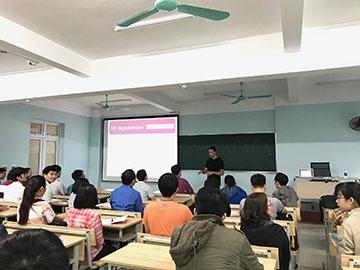By Michael Do, CA3 2020
This past winter, I had the privilege of being 1 of 10 recipients of the Society for Education in Anesthesia-Health Volunteers Overseas (SEA-HVO) Traveling Fellowships. The Traveling Fellowship is a program co-sponsored by SEA and HVO that provides the opportunity for residents to teach anesthesiology in resource-constrained settings abroad. While there are many pre-approved HVO sites in many different countries, I chose to spend my time in two hospitals in two different cities in Vietnam: Huế and Ho Chi Minh City (More commonly referred to as “Saigon” by locals).
In Huế, I spent the majority of my time teaching at Huế University of Medicine and Pharmacy (HUMP). Prior to my arrival to this site, I collaborated with the one of the local anesthesiologists, Dr. Thinh, to create a curriculum and series of lectures suitable to the level of experience of the anesthesia trainees at this site. During my time on-site, my days consisted of two daily didactic lectures (one in the morning prior to the first surgical case of the day, and one in the evening after the majority of surgical cases had finished) and afternoon bedside teaching. The didactic lectures ranged from theoretical topics such as Minimum Alveolar Concentration to more practical topics such as ACLS and Local Anesthetic Systemic Toxicity. These topics were selected by the local anesthesiologists based on recent cases seen in the hospital. As the department had recently received an ultrasound machine a few weeks prior to my arrival, the majority of bedside teaching consisted of ultrasound-guided regional anesthetic techniques for both orthopedic procedures and interfascial plane blocks for abdominal procedures. With guidance and collaboration from the local anesthesiologists, we also helped teach a few workshops including an airway management workshop tailored to the specific equipment the hospital had available, and a “crisis management” workshop where practical learning points were emphasized for emergent and urgent situations. In addition to my teaching responsibilities, I utilized my management training to work with local anesthesiologists to develop clinical protocols and algorithms to assist the hospital staff in an effort to encourage continuous improvement even after my departure from the site.
In Saigon, I was joined by two colleagues from UCSF, my Global Health Mentor Odi Ehie and another Chief Resident Shona Lee. Together, we worked to create a curriculum for the learners at the Hospital for Traumatology and Orthopedics (HTO) (more commonly referred to as Bệnh viện Chấn Thương Chỉnh Hình to the local Vietnamese). While the Huế University School of Medicine and Pharmacy was a training institution with trainees of varying skill levels, the anesthesiologists at HTO had completed their training and were proficient in practical skills such as ultrasound-guided regional nerve blocks. Thus, the local anesthesiologists selected lecture topics that focused more on theoretical concepts and up-to-date recommendations from guidelines from the United States.
Overall, my time in Vietnam was by far the most enlightening and rewarding experience I’ve had during residency. Not only did it allow me to consolidate my years of training by reaching that final step of “See one, do one, teach one,” but it allowed me to catch a glimpse of practicing anesthesiology in a country with limited resources. My experience in Vietnam was a time of personal growth and learning, a time of consolidation and reflection, and a time of true fulfillment and reward. Seeing the how devoted the local providers were, how ingenious and crafty they utilized the limited resources they had, and the way with which they practiced compassionate care was truly inspiring. As anesthesiology residents in the United States, we can sometimes be so stretched physically and mentally that we lose sight of why we went into medicine in the first place. Practicing anesthesiology in a resource-constrained country really brings the world into perspective, and quite frankly, changed the context in which I think about healthcare. This entire experience has given me a renewed enthusiasm and passion not just for global health, but for the field of anesthesiology as a whole.
I am extraordinarily thankful to the Feintech Family, SEA, and HVO for giving me the opportunity to experience anesthesiology in this manner, to the UCSF Global Health Pathways program and the UCSF Anesthesia George Gregory Global Health Endowment for supporting my endeavors in Vietnam, and of course, to the staff and anesthesia trainees in Huế and Saigon whom made me feel like family.
Society for Education in Anesthesia-Health Volunteers Overseas (SEA-HVO) Traveling Fellowships
